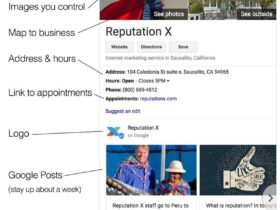This article will help you make the best decisions for your online reputation when navigating your social network friends and the social media sites you use.
Do you accept social media friend requests from anyone and everyone on Facebook, LinkedIn and other social platforms? Many of us do.
Consider this, though: The social media users that you don’t know in real life can have a major impact on your online reputation.
Does that mean you should never engage with an online community or make friend connections on a social media platform? Of course not. But it does mean that you should prioritize your digital reputation when making friends in an online environment.
Social media users spend a lot of time on the platforms of their choice. On average, they’re on social media for 2.5 hours per day and use 7.5 platforms each month, according to DataReportal. That means there are a lot of opportunities to grow your online network and benefit from it.
In this article, we’ll give you easy-to-follow tips for forming friend connections and engaging with active users while still prioritizing your own well-being online.
We work with clients to help them build their online reputation and take control of their digital presence. Give us a call at
844-230-3803
to learn more.
How To Make Friends on Social Media the Right Way
The first step to protecting your online reputation while engaging with a social media community is to build your network the right way.
Join Niche Communities

Whether you’re on Discord, Facebook, LinkedIn, Reddit or another social platform, there are niche communities of people where you can meet like-minded users. Join these groups, get a feel for the atmosphere, and then start contributing and engaging regularly. Instead of spamming the groups with self-promotional content, get involved in conversations and only share resources that are truly helpful.
Post Valuable Content
Whether you’re using social media for personal or professional reasons, you should only post valuable content in order to forge strong connections with other users. Post content that’s educational, entertaining or inspirational. Behind-the-scenes visuals, curated resources, insider tips, and personal stories are all good ideas for content that invite others to interact.
Be Authentic
People want to connect with people, not personas. Be transparent about who you are, including your passions and your values. Whether you’re posting about your daily life, your career, or something you’re struggling with, show your authenticity and vulnerability. This will help build trust with your audience.
Engage Thoughtfully


Engaging with your online network should be about more than gaining exposure and piling up connections. Be intentional when speaking with your friends online. Ask them questions, compliment their wins, and add insights to their posts. By engaging with them in a real way, you’ll show them that you’re truly interested in what they have to say, and you’ll build deeper relationships as a result.
Remain Respectful
Social platforms can become toxic fast. In order to maintain your online friendships and protect your reputation, remain kind and respectful even if you disagree with someone. Be civil instead of resorting to sarcasm or nasty words, and make sure you’re only involved in online communities that are good for you and your digital reputation.
Post Consistently
While you don’t want to post so often that you annoy and overwhelm your social media audience, you want to be consistent enough to stay relevant and familiar to your connections. On the other hand, if you go completely silent for a while, you’ll break the momentum and will have to rebuild the connections you worked so hard to forge. Instead, stay active by posting a few times a week — this is enough to continually connect with other users without being too difficult of a schedule to keep up.
Make Yourself Available
If you only use your social media to post content, that’s a red flag to your audience that you want to attract attention without putting in the effort to forge true connections. When someone comments on your content or sends you a DM, respond in a timely manner. Being available makes you approachable and helps build rapport with your online network.
Today, online reputation management is more important than ever before. Get started with a free analysis here or explore our services offered through our parent company, NetReputation.
How To Protect Your Digital Reputation While Making Friends Online
Now, let’s get into the different ways that you can maintain control over your online reputation even when engaging with your new and evolving social network.
Go Through Each Platform’s Privacy Settings
Every social media platform has privacy settings that you can adapt to your needs. You can set who’s able to see your content, tag you, or send you a DM, for example. Regularly review these settings to ensure your content is reaching the people you want it to, without overstepping and infringing on your reputation. In addition to regularly reviewing these settings, make sure to look them over after a new feature or an update rolls out.
Use Smart Security Practices


An insecure social media account can easily be hacked, which can lead to reputation damage. According to the FBI’s Internet Crime Complaint Center, impersonation scams are trending upward, with both government impersonations and customer support impersonations on the rise. Set up complex passwords and two-factor authentication (2FA), and don’t use an unsecured network to log in to your accounts.
Regularly Audit Your Digital Footprint
Set up Google Alerts so that you know whenever your name or brand name is mentioned online. Also, every month or so, go over your social profiles to ensure they still reflect the online presence you want out there. Check for outdated or inappropriate information, as well as content that no longer shows the side of you that you want to portray. Edit your social presence as needed.
Manage Your Associations
The connections you make online matter, and others will judge you for the people and brands in your social network. Make sure to not endorse, follow or interact with individuals or brands that could damage your online reputation. Controversial and toxic people and companies should be avoided.
Act as Though Everything’s Public


Never assume anything on social media is private, not even your DMs or activity in closed groups. Screenshots can be taken and shared of pretty much anything you do online, and an error on a social media platform can expose content that you assumed would always be private. Before posting something controversial, think about what would happen if it went public.
Use Social Platforms To Shape Your Online Narrative
Social platforms are great places to post and share reputation-building content. For example, post links to your blog posts, share career milestones, and show photos and videos of your volunteer efforts. When you put up positive content, it can counteract any negative information that may be out there about you.
Address Negative Content ASAP
If negative content about you or your brand appears online, stay calm — this happens to just about everyone at one point or another. Decide whether to ignore, respond to, or report the content. Keep emotions out of it so you don’t do further damage to your digital reputation.
Final Thoughts About Social Media and Your Online Reputation


In today’s digital age, your social platforms provide more than just places to connect — they’re integral parts of your person and professional brands, too.
While making online friends and networking can unlock opportunities, though, it also exposes you to reputation damage.
Luckily, building online relationships while protecting your digital presence is possible.
At OnlineReputation.com, we provide must-know information to individuals and businesses who want to create, grow or repair their digital reputation. Whether you’re prioritizing your personal or professional online reputation, our advice and team of experts can help.
Get started with a free online reputation analysis here or call us at
844-230-3803
to speak with an expert.















